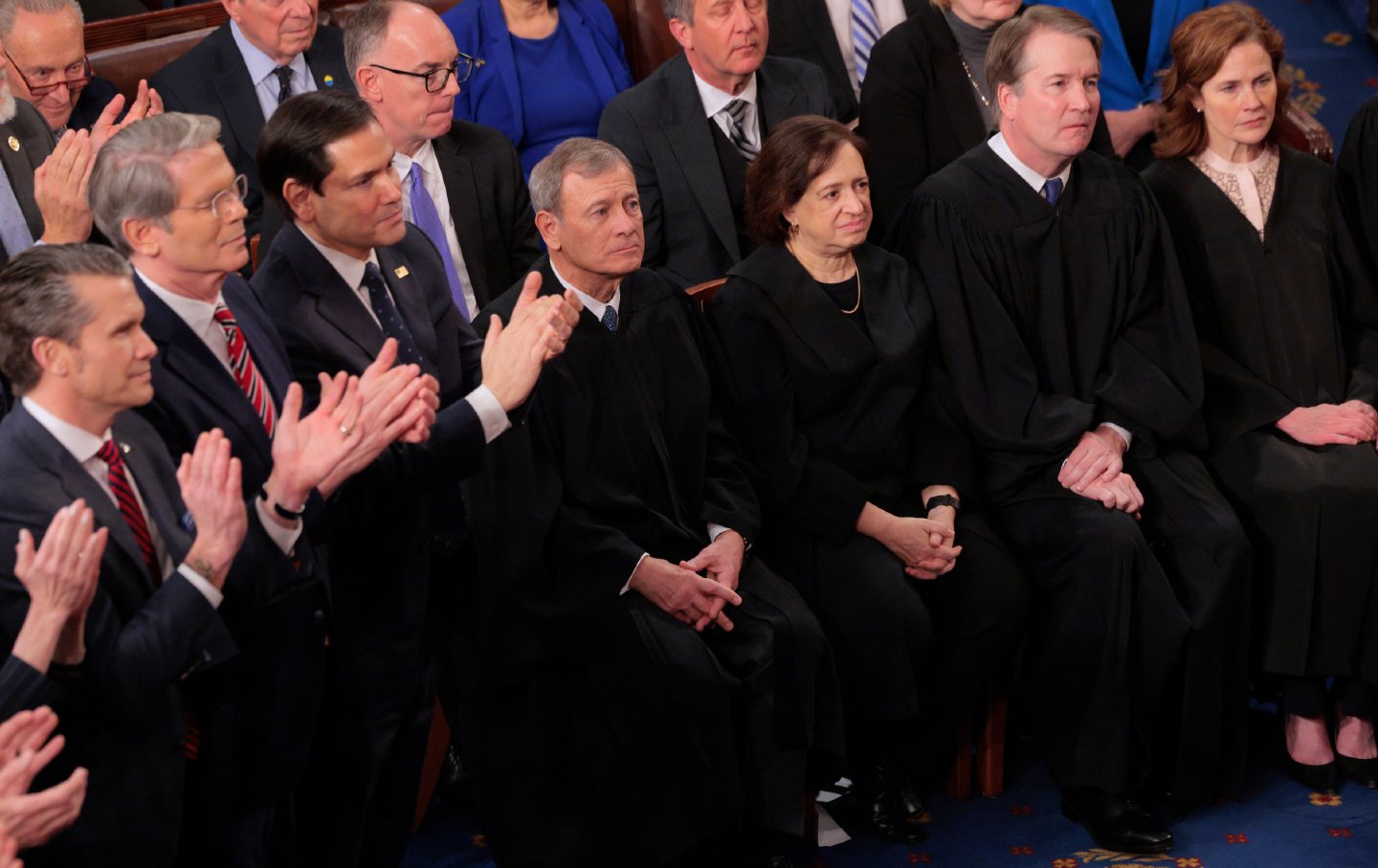Trump Is As Gullible as He Is a Threat to Democracy
A decade into his political career, Donald J. Trump is entirely at the mercy of his own BS.

A sign at The Wieners Circle, a popular hot dog restaurant in Chicago, in response to a statement made by former president Donald Trump during his Tuesday-night debate against Vice President Kamala Harris.
(Photo by Scott Olson / Getty Images)
Midway through Tuesday’s debate, Donald Trump launched into a tirade about migrants stealing Americans’ cats and dogs and devouring them. Trump made this bizarre allegation on national television as part of his ugly, nativist broadside against immigrants. But the claim, previously shared by his running mate, had already been debunked by local officials in the vicinity in which the events were rumored to have occurred.
The debate moderators pushed back against these outlandish claims. Trump dug in. After all, his crusade against non-white immigrants has always been story-driven—rather than based on any actual data—in an appeal to crude emotions rather than to reason. The MAGA-man had heard about the so-called pet eaters on television, he said; ergo, it must be true.
In the same debate, as Harris and the moderators pushed him on his attachment to conspiracy theories about the 2020 election, Trump made a revealing statement. He said that nameless advisers had told him that if he got more than 63 million votes, he was a shoo-in for reelection. Sure enough, he got more votes than that, but he still lost.
In Trump’s mind, rather than that meaning that his opponent, Joe Biden, had gotten more votes than him in an election with historically high levels of voter turnout, it meant that he had been cheated out of his win. That’s as myopic, as flat-out dumb, as the chess player who forgets that he has an opponent, fails to anticipate any of the moves coming in against him, loses the match, and then promptly denounces his opponent for rigging the game.
Partly, this is Trump simply spouting Trumpian hyperbole. But I think it goes to a larger issue.
Donald J. Trump is a gullible human being. The more time that passes, the more gullible he gets. Far from being the thoughtful genius of his inflated self-image, he is more akin to the slightly befuddled 78-year-old man surfing the Internet who gives away his passwords in response to a plea from a prince from some far-flung location who has a once-in-a-lifetime business opportunity he wants to pass along out of the kindness of his heart.
Think about it: The far-right media says cats in Ohio are being eaten as appetizers. Trump thinks, “Who am I to disagree?” Sycophantic advisers tell Trump he must have won the 2020 election. Who is the failed erstwhile president to do a reality check?
We could all relate to Harris’s putting on the facial expressions of a bemused, slightly sorrowful, relative looking at a family elder making a public spectacle of himself. And the way she treated this odious individual with sorrow rather than fury, to laugh in amazed exasperation rather than to try to debate him on these outlandish points. After all, if one’s opponent is either too cynical or too foolish to distinguish truth from fantasy, why waste one’s breath—and one’s moment in the television spotlight—trying to put him back on the straight and narrow?
But, as Harris acknowledged, in his current state, Trump remains a huge threat to American democracy.
Usually, failing candidates have enough self-awareness to not fully believe their own post-debate spin. In Trump’s case, there is no sense of humility. He is now, a decade into his political career, entirely at the mercy of his own BS. Hours after the debate, deploying his finest elementary-school oratorical skills, MAGA-man told the world that he “won the debate by a lot.”
Surrounded by yes-men desperate to prove their loyalty to the boss, Trump has convinced himself that he has a “weave” of oratorical genius. If audiences and commentators don’t respond with appropriate enthusiasm, and if voters in November end up giving him another Bronx cheer, Trump’s default belief system will kick in again: He didn’t lose. He couldn’t have lost—he was smarter and better-spoken than Harris, younger and better-looking than Harris… It must be a conspiracy! And once that part of his brain kicks into gear, it’s only a short hop and skip to inciting post-election violence and political dirty tricks, much as he did in 2020.
Unfortunately, there are many people in positions of power willing to go along with Trump on this autocratic ride. Board of Elections officials in Georgia are hard at work crafting new regulations that will make it far easier for local political figures to challenge the vote process and vote count in their jurisdictions. North Carolina Republicans have engaged in a full-court effort to empower the state legislature to take away authority from local elections boards—a power presumably to be used against big, urban, Democratic districts. Last week, the Associated Press reported that Republicans have already filed more than 100 lawsuits around the country challenging various parts of the voting process.
And while 17 states have signed on to the National Popular Vote Compact, agreeing to allot their Electoral College votes to the winner of the popular vote once states representing more than half the total number of votes sign on to the compact, many GOP legislators are stampeding in the opposite direction. In Arizona over the past year, some lawmakers have tried to advance bills that would give the legislature broad powers to subvert the popular vote in the state—and the country—and essentially impose their presidential choice over the will of the people in order to install as president the loser of the popular vote. In 2020, conservative legislators in Wisconsin sought legal advice on whether they too could simply appoint their own electors.
None of this would matter if Trump were willing to say unequivocally that he would accept the election results even if they go against him. But, time and again, he has refused to do so. As a result, voters are heading into an election where, once again, they must face a brutal stress test of the nation’s democratic infrastructure.
Hold the powerful to account by supporting The Nation
The chaos and cruelty of the Trump administration reaches new lows each week.
Trump’s catastrophic “Liberation Day” has wreaked havoc on the world economy and set up yet another constitutional crisis at home. Plainclothes officers continue to abduct university students off the streets. So-called “enemy aliens” are flown abroad to a mega prison against the orders of the courts. And Signalgate promises to be the first of many incompetence scandals that expose the brutal violence at the core of the American empire.
At a time when elite universities, powerful law firms, and influential media outlets are capitulating to Trump’s intimidation, The Nation is more determined than ever before to hold the powerful to account.
In just the last month, we’ve published reporting on how Trump outsources his mass deportation agenda to other countries, exposed the administration’s appeal to obscure laws to carry out its repressive agenda, and amplified the voices of brave student activists targeted by universities.
We also continue to tell the stories of those who fight back against Trump and Musk, whether on the streets in growing protest movements, in town halls across the country, or in critical state elections—like Wisconsin’s recent state Supreme Court race—that provide a model for resisting Trumpism and prove that Musk can’t buy our democracy.
This is the journalism that matters in 2025. But we can’t do this without you. As a reader-supported publication, we rely on the support of generous donors. Please, help make our essential independent journalism possible with a donation today.
In solidarity,
The Editors
The Nation








